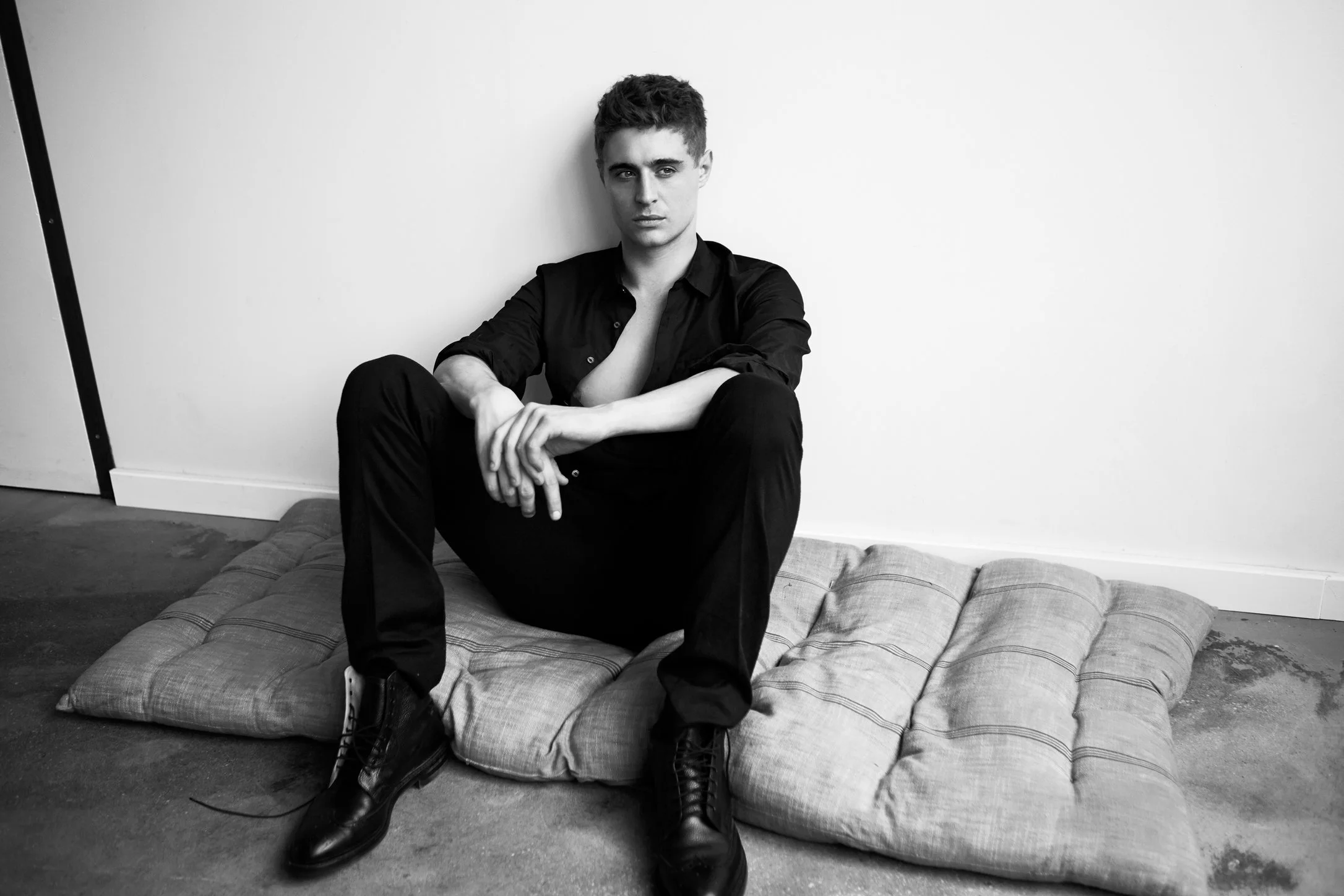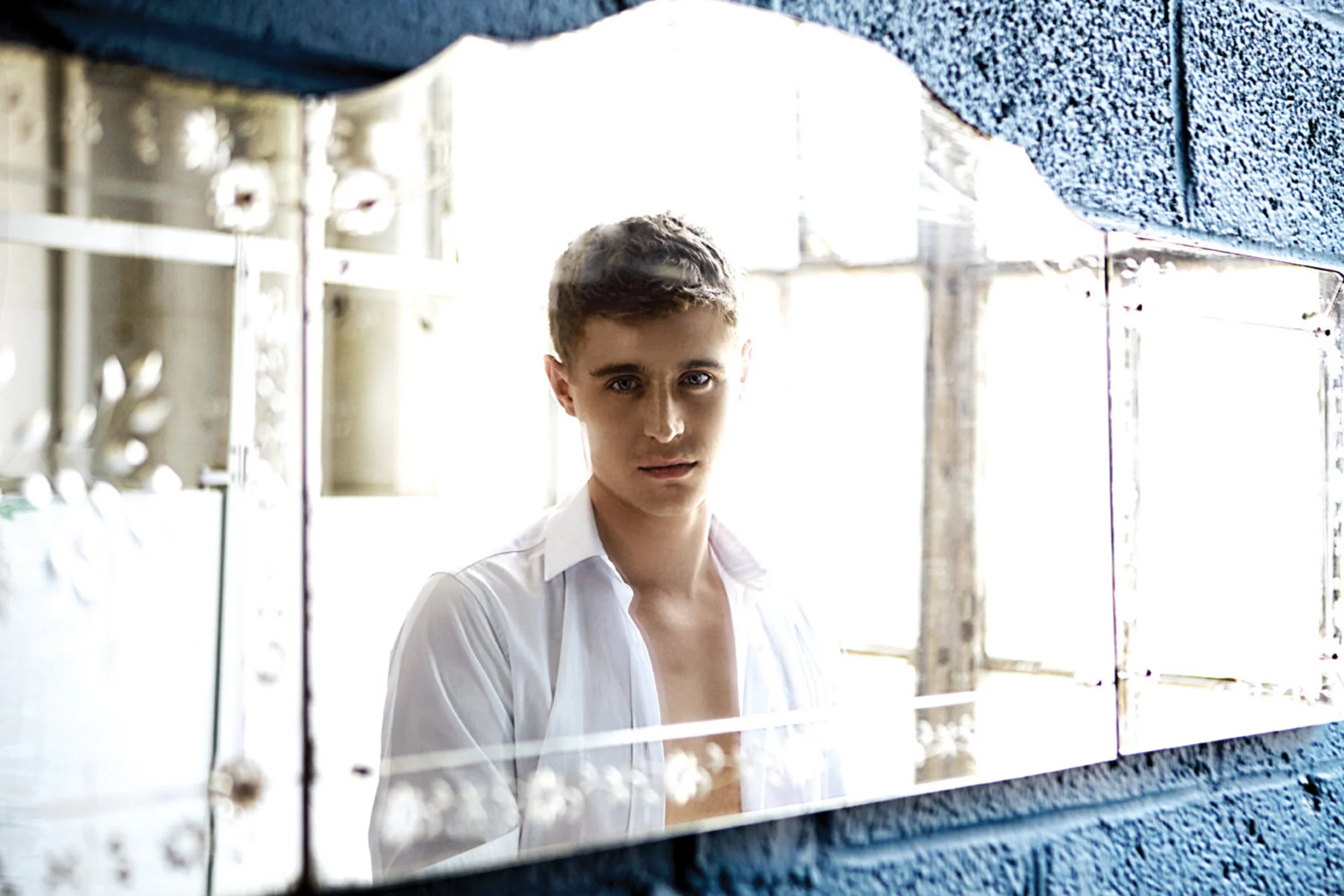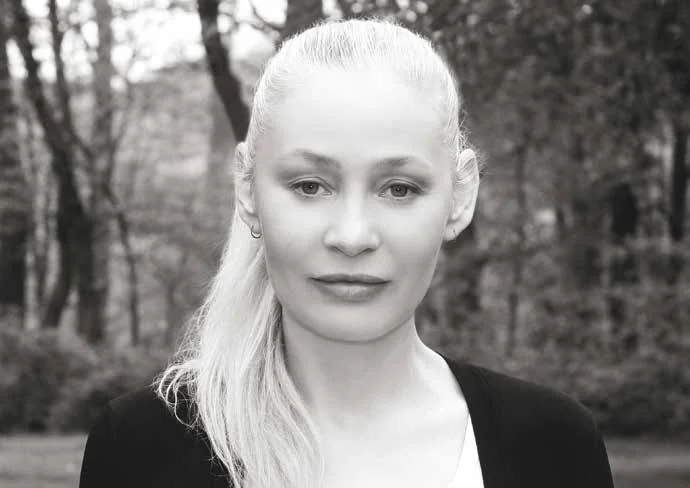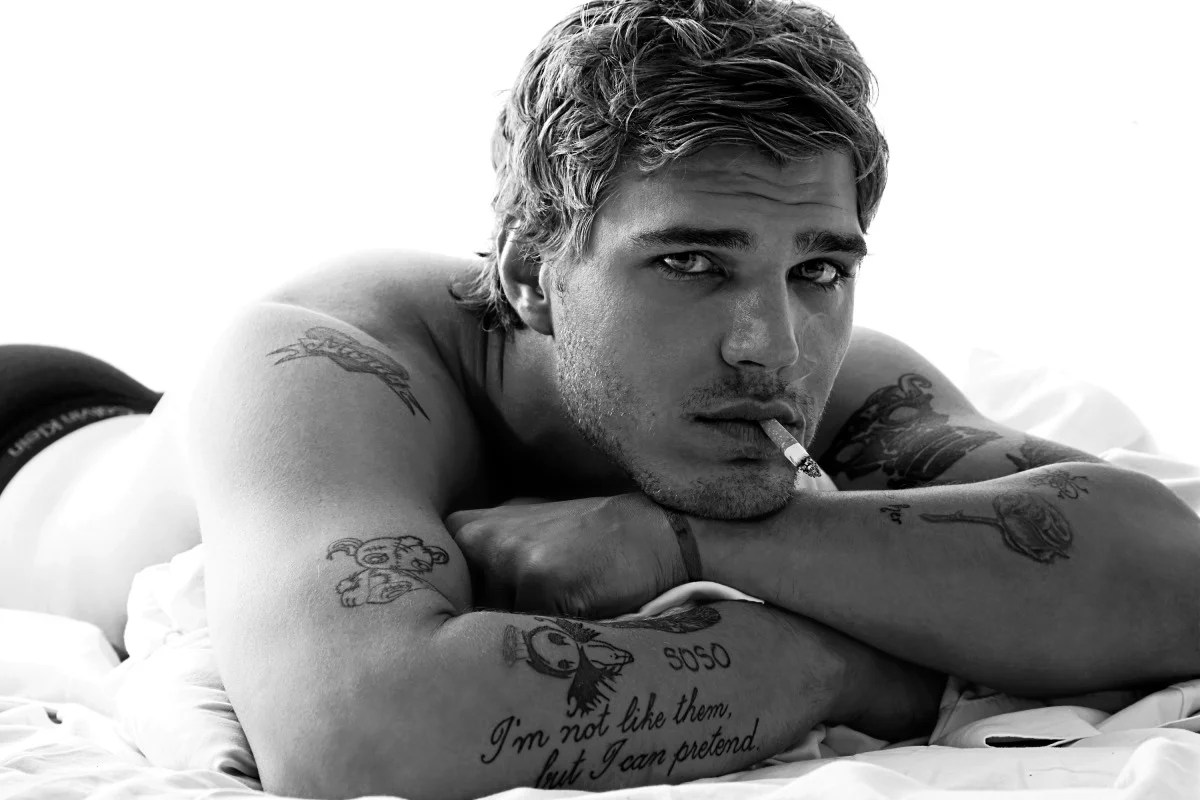Max Irons
Max Irons is busy. Very busy. And so, after many failed attempts at conducting this interview in person, we finally settled on Skype to bring us together; he while vacationing in Greece, and I in NYC suffering through a blistering heat wave. Even with over 4,700 miles between us, and some shoddy reception, Irons’ natural good looks, and 6’2 frame are visible to me through my 15” screen as he lounges on the balcony of his Grecian hideaway. With the whitewashed buildings and radiant blue sky behind him, it’s hard not to envision Irons as some Greek statue come to life, albeit one with a penchant for cigarettes. As I wiped the sweat from my brow, and tried to control my jealousy, Max talked frankly about his family (he’s the son of actor Jeremy Irons), dyslexia, and his latest film, The Riot Club, a fictionalised version of Oxford University’s infamous Bullingdon Club; an elite dining club known for its extravagant banquets, and acts of vandalism by its privileged members. One might think that Irons, born into wealth and privilege would be unfazed by the behavior and hypocrisy of the elite. One would be wrong.
Thom: Wow, you’ve got a pretty stunning view going on behind you. How long are you in Greece for?
Max: I’m here two weeks in all, and I’ve only got about a week left. I’d been looking forward to this for about twelve months, ever since we came here last year. How is it in New York? Is it still hot?
Oh yeah.
This year was my first real experience of being in New York in the height of summer, and, Jesus Christ, I was melting! There was no point of even wearing a shirt. T-shirts only! I was just a sweaty mess!
Most people know your dad, (Jeremy Irons), but few may know that your mom (Sinead Cusack) is also a well-respected actress. Growing up in this environment, did you know you wanted to be an actor from an early age?
No. I sort of realized it when I was about sixteen. I did a play by Neil LaBute, a two-hander called The Gaggle of Saints. Up until that point I’d been auditioning for parts, but found myself going up for things like Oliver, and Fiddler on the Roof, or one of the dwarves from Snow White; plus I had terrible dyslexia, which made auditioning very difficult. Doing the Neil LaBute was my first real opportunity to get my teeth into something serious. Once I did that, I thought, “Jesus, I’ve never had so much fun, or been so interested in something as this,” and so I continued to do it from there on.
Did your parents encourage your acting career?
They sort of discouraged me in the early days. They said, “Don’t look at us, and think it’ll necessarily be the same for you. Our careers have been a combination of hard work, and good luck,” and a little bit of talent thrown in there, but they didn’t say that. But when they saw I was enjoying it, and going about it in the right way, they sort of backed off, and let me do my own thing. I think they wanted me to grasp that no matter who you are, or how successful you are, an actor’s life is one of instability, financial worries, jealousy, paranoia, and being away from your loved ones a lot of the time.
You once said that no matter what you do you’ll never be able to please your parents. I assume you meant as an actor.
Well, yes, certainly! But, one day it occurred to me that everything I hope to achieve professionally, they’ve already done. They’ve worked with all these wonderful people, they’ve won the awards, they’ve been involved in these incredible projects, and so, I can never surprise them, or amaze them in the way that I might if it was all new to them; and though there is something about that that makes me feel a bit sad, it’s also very freeing.
Do you ever feel pressure to live up to the Irons name?
To be quite honest, it’s never really bothered me. I accept certain things, like Dad’s really good at what he does, but I also know that when he started acting he wasn’t; and the same for my mother. In fact, my mother was told once by a very respected actor that she should marry someone wealthy because she didn’t have the talent to be an actor, which she, by her own admission didn’t have when she was younger. But she worked her way up, and learned her craft. I feel the same applies to me, and certainly to any young actor. When you start out you’re not that good, but you can get better, and do get better. When you’re fresh out the gate, you’re not running at top speed; you’ve got to allow yourself a chance to learn. Unfortunately, the business now, especially for young people, is that you’re encouraged to get involved in a massive franchise, and be a mega star overnight. I think quite often it’s a bit of a curse, unless you’re really lucky.
Do you think it’s an American thing, or are young English actors also being advised to go that route?
It is unfortunately the model, and encouraged by agents everywhere because it’s where you make the money. If you’re involved in one, it makes it a hell of a lot easier to be involved in an independent movie because they believe you bring a certain cash value to it, and investors are more likely to invest. In my early career I did a few parts that were not artistically fulfilling to me, but it was hoped that they would become franchises. They didn’t, which I guess is a gift and a curse. But ultimately I think the best approach is to build a foundation of good solid work in the way that all the great actors that we know and respect did.
Your brother once co-starred with your dad in a film. Do you have any desire to play opposite your father?
Frankly, no! (laughs) And I don’t think he does, either. I think maybe one day to do a little theatre together might be nice, but he’s got his career, and I’ve got mine, and we’re both respectful of that.
You’ve said that while growing up your parents shielded you from the superficial side of the business. When did you realize your parents were famous?
I always knew they were famous. I remember when I was just a tiny thing, there was this photographer in our garden, hiding in the bushes taking pictures, and Dad threatened him with a shovel. As a kid you just sort of get used to it, people asking for your parent’s autograph or to take a picture with them. What they shielded me from was the film sets, and the parties, that sort of thing.
I read somewhere that your dad owns a castle in Ireland. Can you tell me about it?
Well, we have this tiny cottage that’s in the middle of nowhere, and we’d go out on our little boat and ride around. One day we’re out riding along, and dad saw this ruin on an island. Now, Irish castles, they sort of look like towers, and in this case it was two interconnecting towers, and it was completely ruined. All that remained was the walls, but it was still fairly magnificent. Dad found out the island was on sale for a ridiculous small price, peanuts really, and he decided to buy it. Over the course of six or seven years he had it redone in the fashion of Irish architecture of the time. It’s kind of great, but it’s a bit weird as well.
You mentioned being dyslexic. Was there any hesitation in pursuing a career so steeped in text and language?
No, because all I have to do is learn everything. That’s the only difference between me and a non-dyslexic actor. If I go into an audition, and it’s a cold read, I’ll just ask if I can have fifteen minutes, and I’ll go away and get familiar with it. For the most part, when I go to an audition now, I learn everything in advance. When I auditioned for drama school (Max attended the prestigious Guildhall School of Music and Drama in London) you had to fill out a form listing any disabilities you may have. I called them up and asked if I had to put dyslexia down, and it turns out that at drama school it’s practically a qualification; something like forty-five percent of drama students have dyslexia, as many creative people do.
At Guildhall did you study film acting, or was it strictly theatre?
It was ninety-nine percent theatre. You do only a couple of days of film work, despite the fact that when you come out seventy percent of what you’re going up for is film. It’s actually a bit of a disservice to students since it’s such a big difference in style.
Does dyslexia make stage acting more of a challenge than film acting?
Not at all, in fact, about six months ago, I did a play called Farragut North, which was just over a hundred pages long - seventy percent of which was mine. We had three weeks to learn it, and there was one night in particular that I thought, “I’m going to go drink some vodka and step in front of a car, because I can’t fucking do this!” I wasn’t going to kill myself, but just break a leg or something to get out of doing it. But in the end it was fine. Dyslexia doesn’t hurt with learning, just the reading.
After graduating you were being primed to be the next tween heartthrob. Did you have any trepidation about being in a film that could turn you into an overnight sensation?
Yeah, I did. But I also knew it was a bit bullshit. After Twilight came out every young actor, especially in England, was being called the next Robert Pattinson. People were hungry for it. In both the films I did (Red Riding Hood and The Host) they were trying to come up with the same magic formula that led to that phenomenon, and missed. I try not to worry about that stuff though, because it’s out of my control. I’m not the kind of actor who wants to manufacture it. I don’t do Twitter or Instagram; I’m just not interested in playing that game. If it happens, I’ll deal with it, but the idea of losing my personal freedom is just a nightmare. I get recognized now and again, but people are very nice about it, and my life hasn’t changed, which I am grateful for.
The press tours for those films must have been a blast though.
When you like the people you’re doing them with it’s great, but you also have to be careful because all day long you’re in a position of people listening to you, and laughing at your shitty jokes, and something sort of creeps into your subconscious that you’re much more interesting than you really are. I remember this one time in particular where I had been doing Red Riding Hood press for weeks, and someone was talking about the threat of the wolf, and I remember briefly comparing the wolf to the Patriot Act! I thought to myself, “Okay, I’ve lost my mind! Just shut up, you’re not that clever!” But, you know... you just want to keep yourself entertained.
I just saw the trailer to your new film The Riot Club. It looks really good.
It’s the first thing I’ve done that I’m incredibly proud of. It’s by a great director (Lone Scherfig) and has a really important subject matter, and a really great English cast. I don’t know if it will get a massive release, but I’ve seen it, and it’s amazing. I know there’s a lot of interest about it, which is great. You know, every now and then you’ll do a film, and you look at it and think it’s not quite how you hoped it would be, but with this one, it surpassed all expectations.
Was it a rowdy set?
I was actually worried because I’m not very good dealing with men, and banter, and all that sort of jock stuff, and I thought it might be like that. Ten young guys all in a room together, all actors, all showing off, wanting to get the last laugh. I thought, ‘God,’ this is going to be a nightmare, but in fact, we all got along incredibly well because we were all on the same page with what kind of film we were trying to make, and how important it was. Plus, we had a great female director who kept us all in check.
Did you and your castmates wreak havoc off set in the name of “research.”
We did once, but we were also very cautious not to be seen in any way glamorizing this kind of behavior. Falling out of a club at four in the morning, drunk out of our skulls, might not be the best thing to do.
Something I’ve noticed while researching you is that you’re very outspoken. You’ve called out some very prominent politicians who were part of the Bullingdon Club, you’ve also said you would rather die than be a politician and that you absolutely hate Los Angeles. I’m just curious if your PR people are ever, like, “Max, shut up!”
First of all, I never said I hated L.A. I’ve only said that I wouldn’t want to live there. I think the only thing I’ve been outspoken on is the subject matter surrounding this film. A few years back we had these riots in London where a lot of underprivileged sixteen-year-old kids got collectively angry and rowdy, and smashed windows, and set fires. Now, I’m not endorsing their behavior it was unacceptable but what was also unacceptable was the way our elected politicians dealt with it. They called these kids thugs and hooligans. They branded them as “urban scum.” The Prime Minister and Mayor of London shut down their youth centers and gave them three-year extended sentences to make examples of them. That, for me, is unacceptable. The worst thing of all, though, is that these same politicians at one point were in a club where similar things happened, except they were afforded every advantage in life financially and educationally. Plus, they were at a far more discerning age, and yet they are so fast to brand these kids as thugs. And the thing is, when these politicians were asked about their past, and being involved in the Bullingdon Club, they just dismiss it and say “Oh, it was a time in our lives.” That’s just not good enough for me. I mean, fine, it was a time in your lives, but if you’re sending kids to jail for three years, be absolutely certain that label will follow them in their professional careers. These kids are going to be haunted by that, so just fess up about what you got into when you were younger. I don’t know, it just rubs me the wrong way.
Have you received any backlash for your outspokenness?
I am a little concerned actually. I recently did an interview that hasn’t come out yet, which I may get a little backlash for.
Max, one last question and I’ll let you get back to your holiday. The theme for this issue of UTP is minimalism. If you had to pare your life down to the bare essentials, what and who would you surround yourself with?
Oh God, let’s see... my girlfriend, cause she’s the best... a little cottage I think would do really nicely, maybe somewhere by the water... some good food, a dog... It’s actually sort of what I’m going for in my life - not at the moment -but when the time is right that’s what I’m after. Oh, and maybe kids... maybe. I don’t know, I’m trying to keep it minimal here!












